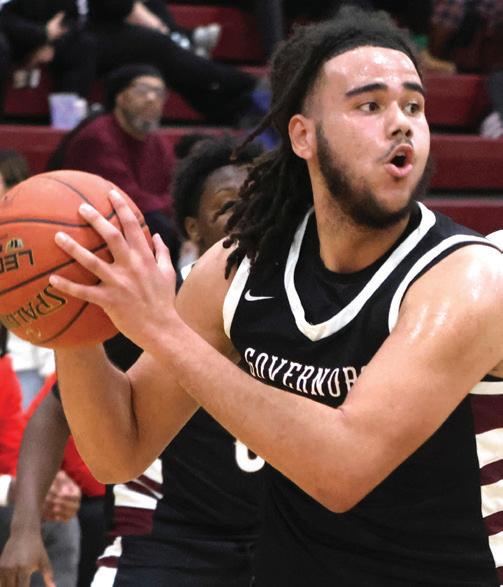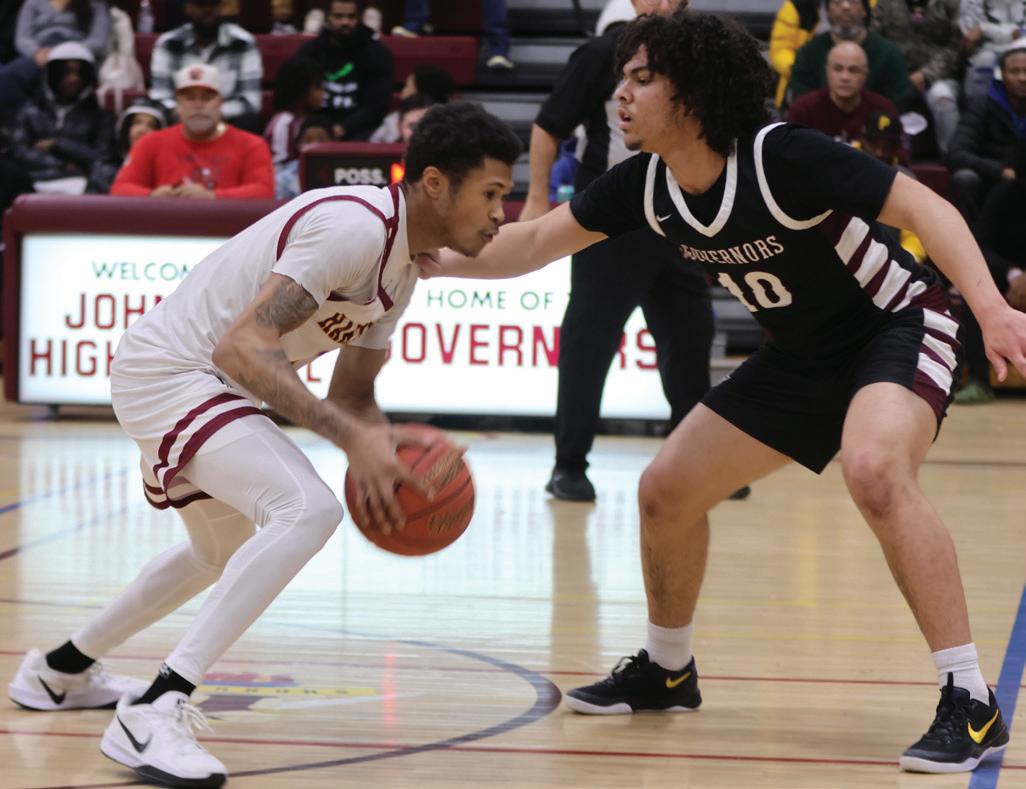




By Vickie Evans-Nash Contributing Writer
artin Luther King
Day is a time to remember the legacy
of the most prominent civil rights leader in U.S. history. He is one of the few leaders who activated change on a political level without being elected to public office.
Behind every speech he gave and every march he led was a purpose, a call to action.
In that spirit, many leaders in the Minnesota community are commemorating his life and legacy by continuing to an-
swer the call.
Timothy Berry, interim associate vice president for faculty affairs and equity initiatives for Mankato State University, remembers the marches and efforts to commemorate King’s legacy. From where he lived in North Minneapolis, Berry saw the efforts to put King’s name among those celebrated for their contribution to this country.
“The holiday is fine, but it’s more about the commemoration and remembering King in the same way that people remember other so-called great
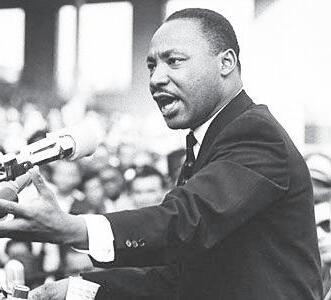
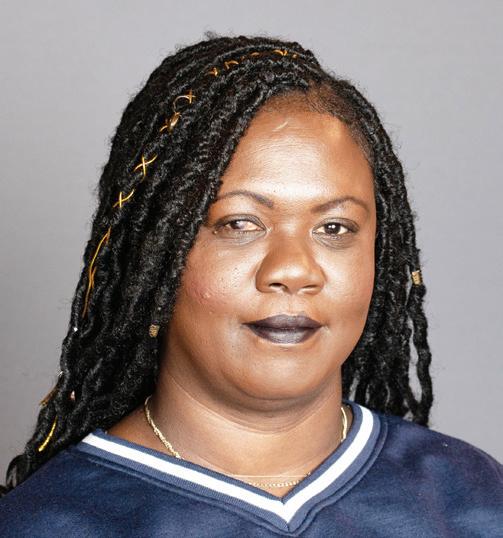
Dr. Martin Luther King Jr.’s profound question, “What are you doing for others?” challenges us to embrace service as a moral responsibility. His legacy reminds us that true leadership is rooted in uplifting our communities, addressing injustice, and creating opportunities for all. Dr. King understood the power of civil disobedience as a necessary tool to dramatize injustice, awaken public consciousness, and push for meaningful change. I’m committed to honoring his vision by fostering collaboration, empowering families, and advocating for equity. His life inspires us to serve with compassion, courage, and unwavering dedication to justice.
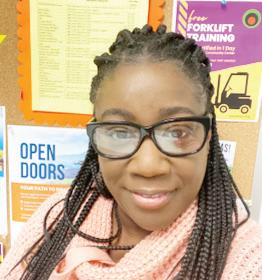
Maria Sorensen, career coordinator, Sabathani Community Center To me, celebrating Dr. Martin Luther King Junior Day is a moment to honor the legacy of a man who fought for justice, equality, and the dignity of all people. I believe for my community this day represents hope, unity and resilience. And as an African American woman, this day reinforces my pride and my responsibility that I have every day. It’s a reminder that the freedoms I enjoy were hard won, and it encourages me to honor those sacrifices by using my voice to live with purpose and to contribute to my community’s progress.
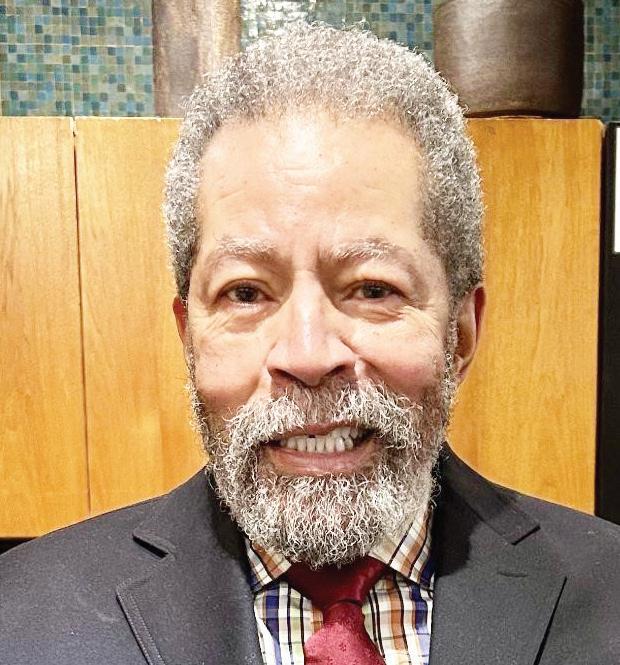
Russel Balenger, former St. Paul City Council member, founder of The Circle of Peace Movement
When Dr. King was at the height of his career, I was in high school. At that time, we were talking about Black Power and the Black Panthers and what was going on in our community. As we were able to study the work of Martin Luther King, we realized what a great peacemaker he was. It’s the basis for my Circle of Peace movement. We want to have everyone’s voice at our circle; that comes from Dr. King. We know that his life goes on in us, but he should be here.
the center of a table placed as an offering at all events or gatherings. The word “peace” causes the scars of history to itch.
King
would have made fentanyl crisis a top priority
By Vickie Evans-Nash Contributing Writer
astor Donnell Bratton has served the community through his church, Overcomer’s Victory, since 2008. He was able to help meet their needs through the Covid-19 epidemic and the murder of George Floyd. He now sees an “American crisis” and is calling the community to action inspired by the legacy of Dr. Martin Luther King Jr. Bratton was a military kid who moved around to different cities. As an adolescent, his father got addicted to crack and ended up spending years behind bars.
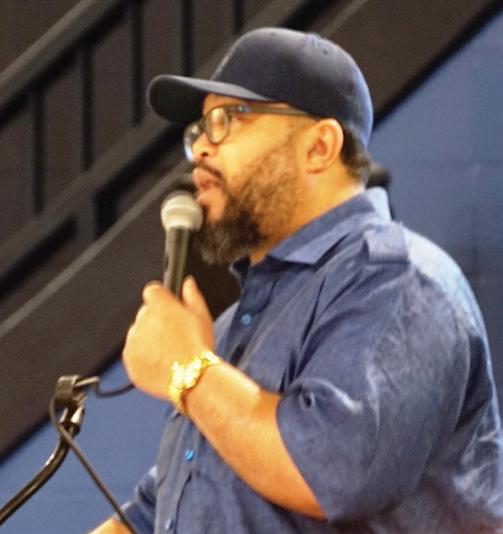
In his early teens Bratton lived in the rough parts of Denver, Colorado. He became heavily involved with gangs and the drug activity that accompanied it. Local police advised his mother to move her
■ See BRATTON on page 5
s we prepare to celebrate the legacy of Dr. Martin Luther King Jr., the MSR asked community members to reflect on how his work continues to influence their lives today. See more responses on Page 6.
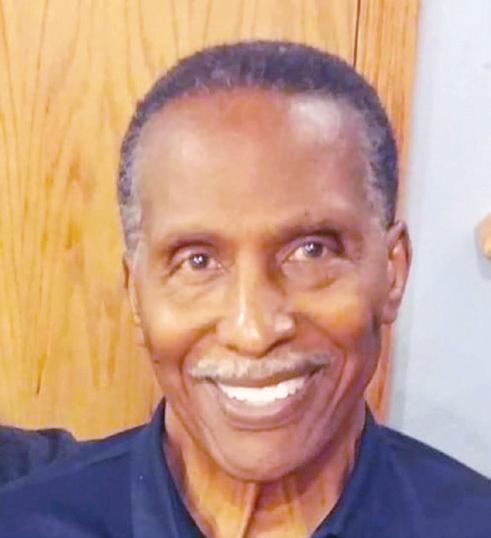
Pastor Curtis Farrar, senior pastor of Worldwide Outreach for Christ Ministries Dr. Martin Luther King Jr. had a major influence on me wanting to serve my community and continue to serve these 45 years. His commitment and dedication to serving the rights of the people spoke volumes to me. To this day, I am still impressed and impacted by his courage, and commitment to God and to the people. Dr. Martin Luther King Jr. was a titan of the Civil Rights Movement, transcending the boundaries of race and social injustice to be a beacon of hope and a catalyst for profound social change.
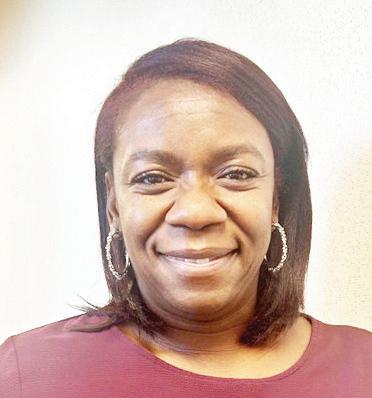
Kelina Morgan, VP of Housing Services of Sabathani Community Center One of the ways Dr. King is most impactful for me was his willingness to risk all for what he believed in — and to live that out, no matter what that would entail for him — to impact the rest of the world and the community that he fought for. In my role, whether it’s housing or working within the social services field, it’s really important that I stand up for those who do not have a voice, and to be in the places that I can be for them and to represent them well.
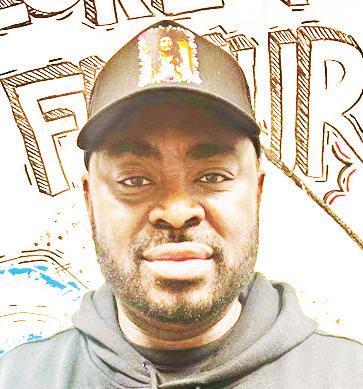
Tayo Daniel, co-founder of Smart North Dr. King’s legacy represents the fountain of youth, because you can plant seeds in people and it will continue to live far beyond you. I try to live out Dr. King’s dream every day by adding value to my community. We do that here by serving youth and connecting with emerging technology so they can compete in this digital world. A day of service is every day for me. Martin Luther King Day will be the day that I’m gonna be gathering with the community and helping people in their service to others.

This scar on the collective consciousness of Black communities shows us the enduring wounds of a distorted notion of what is human that has been produced by another people from another psychic predisposition, a scar on the mind’s eye, leaving us blind to what has been imposed on us. Cultural reconstruction, the building of connection with ■ See CV on page 5 Elder Atum Azzahir
By Clint Combs Contributing Writer
Nearly two dozen police departments across the country are currently under consent decrees, which can serve as a powerful tool to end racist and unconstitutional policing by improving police practices and accountability. Many cities, however, are facing significant delays in implementing these reforms, and in some cases, current decrees have been ongoing for decades.
The Louisville Police Department reached a settlement with the Department of Justice prompted by the fatal police shooting of Breonna Taylor. While that agreement was reached in early December, it still awaits a judge’s approval. In Ferguson, Missouri, a federal judge signed off on a consent decree following the killing of Michael Brown. The city has struggled to meet the outlined reforms, and it currently lacks a coordinator to oversee implementation.
After police fatally shot Tyre Nichols, the city of Memphis walked away before the DOJ could even offer a settlement.
These ongoing challenges highlight the difficulties in achieving meaningful reform within police departments despite the existence of consent decrees.
The federal agreement for Minneapolis, approved on Jan. 6, awaits approval from U.S. District Judge Paul Magnuson. Magnuson is known for his involvement in high-profile cases like Fong Lee’s wrongful death suit and the civil rights cases of the Minneapolis officers in George Floyd’s murder.
The judge has yet to schedule a formal hearing and has not signed off on the agreement.
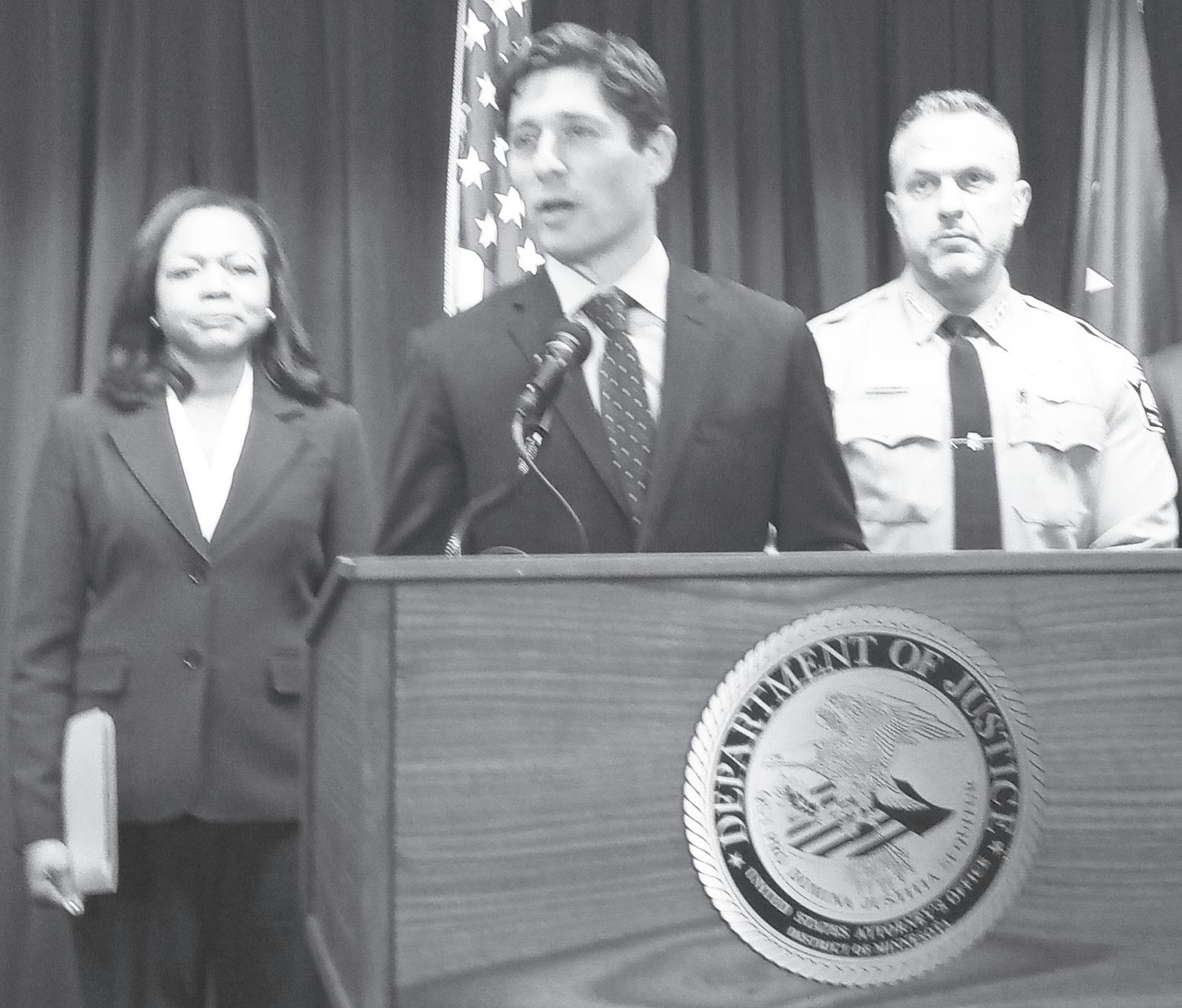
Wilkes to oversee the implementation of reforms. This positions Minneapolis uniquely, as it is already moving forward with reforms while many other cities face delays or uncertainties.
Minneapolis stands out as the first city to agree to police reform settlements under both state and federal jurisdictions.
The state settlement with the Minnesota Department of Human Rights is already in effect,
with a compliance report due by March 17.
The city allocated a total of $27 million in its 2024 and 2025 budgets to implement reforms required by the two consent decrees. This includes $2.5 million set aside to upgrade the city’s IT department to meet the settlement’s demands of increasing accountability and transparency by making data available to the public.
The $27 million is the same
By Jasmine McBride Staff Writer
In today’s world, community engagement has become a cornerstone for building strong, vibrant and supportive networks. For Black communities, however, engagement goes beyond just participation — it’s an act of love, solidarity, and collective strength.
The concept of “Love First” can transform the way we approach community-building, fostering environments where individuals feel seen, heard and supported. Which is exactly what this Rondo-based organization is doing for youth in need within the community.
Love First was founded in 2020 by local leader Chauntyll Allen. Allen’s wife, Satara Strong-Allen, is the executive director. Together, the two provide the gift of transformation by connecting its young participants to strong roots of connection, exploration, and most importantly, support. While resources are a big part of the organization’s offerings in stabilizing our young people, its philosophy brings forth a bigger invitation: to engage in a family that may not be blood, but is just as warm and thick.
Together, we can create spaces where every Black person feels valued, supported and empowered to achieve their fullest potential. As the organization’s title implies, Love First, always, and the
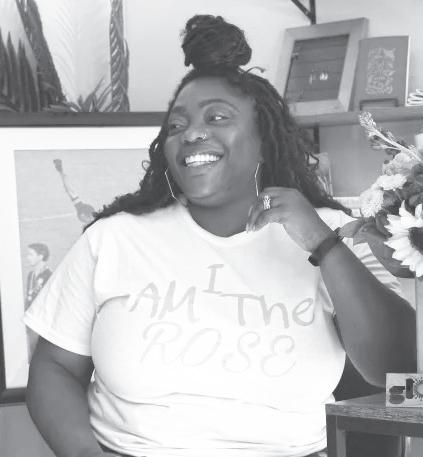
Strong-Allen
community will follow. It’s about creating connections where people freely express themselves without fear of judgment or marginalization. By engaging in our communities with love, we honor and progress the richness of Black culture and identity. Although their direct programming is focused on Black youth 16 to 24, their regular community events are open to locals of all ages, colors and sizes. Love and service were central themes in Dr. King’s messages. Community engagement is more than just sharing space with one another. Their community dinners are growing in popularity, and the next one is an MLK Soli-
darity Community Dinner.
The event takes place 3-6 p.m. on Jan. 26 at Indigenous Roots in East St. Paul. Participants can expect deep reflection on the legacy of Dr. Martin Luther King Jr., and how to engage his revolutionary teachings in one’s everyday lives and environments. Free food and youth activities will be available. Registration is encouraged.
Indigenous Roots is located at 788 E. 7th Street in St. Paul, 651-395-7145, info@indigenous-roots.org.
Jasmine McBride welcomes reader responses to jmcbride@ spokesman-recorder.com.
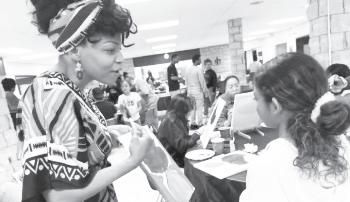
amount paid to settle a wrongful death suit brought by the family of George Floyd, whose murder in 2020 prompted the DOJ investigation and subsequent reform agreements.
To ensure compliance with both state and federal decrees, Minneapolis has selected the nonprofit Effective Law Enforcement For All (EFLEFA) as an independent review board. Additionally, Minneapolis Police Chief Brian O’Hara has selected Commander Yolanda
“The access the monitoring team has to the information necessary to figure out what’s going on is set out in the decree,” said Christy Lopez, a former civil rights litigator for the DOJ and later a monitor overseeing the Oakland Police Department. “That’s really important, and as much as possible, that information should also be available to the public, so they don’t have to rely on the monitor to conduct those analyses on their own.”
This focus on access and transparency aligns with Arlinda Westbrook’s efforts as a monitor with EFLEFA, where she works to improve complaint filing options. “One of the things we found was a void in people being able to file complaints because you have to make an appointment to get into City Hall,” Westbrook said.
“We know that’s not really an open forum for complaints.”
It’s unlikely that Minneapolis will face the same types of delays as other cities, given it has already appropriated funds and named an overseer in the process. But Police Chief Brian O’Hara did note challenges brought on by a shortage of Field Training Officers (FTOs), who ensure new recruits understand and adhere to the legal and ethical standards set forth in the settlements.
“One of our biggest challenges is ensuring we have enough FTOs,” O’Hara said. To address this, he proposed using sergeants or lieutenants as substitutes or offering overtime to train FTOs. FTO training is considered crucial for ensuring officers follow constitutional policing standards, with a focus on accountability and preventing abuses like those seen in George Floyd’s murder.
Clint Combs welcomes reader responses to ccombs@spokesman-recorder.com.
To address this, Westbrook is expanding complaint filing options at community sites through training and resources, in line with the state’s settlement agreement.

By Cynthia Moothart Managing Editor
Buying a home is one of the biggest financial decisions any of us will make in life. When you’re ready to buy a home, finding a real estate agent with the right experience to guide you through the process is critical — as is working with a lender who has your best interests in mind.
There’s no shortage of agents vying for your business. With so many professionals to choose from, finding the right one can feel overwhelming.
There’s no shortage of agents vying for your business. With so many professionals to choose from, finding the right one can feel overwhelming.
The nonprofit Minnesota Homeownership Center offers free expert help so you can feel confident in the many decisions involved with buying a home. The Center’s network of nonprofit homeownership advisors offers unbiased, ex-
pert free advice tailored to your unique situation.
Homeownership advisors are certified by the U.S. Department of Housing and Urban Development (HUD), and their services are paid for through a variety of federal, state and local grants. The Minnesota Homeownership Center serves as a HUD Intermediary, overseeing a network of HUDapproved advisors embedded in community-based organizations across the state.
If you’re seeking a homeownership advisor who speaks your language, shares your background, and has an office nearby, you can use the Center’s search tool to find a great fit. Here are some of the steps homeownership advisors can help you with:
Strengthening your credit score
A strong credit score helps you secure a mortgage with a lower interest rate and more favorable terms. If your score could use some work, an advisor will outline the steps for you to take to improve your score for more sustainable homeownership.
Determining your household budget
Lenders decide how much to give you based on your income, outstanding loans, and revolving debt. They don’t consider other monthly bills, like utility, day care, and health in-

surance costs. As a result, you could prequalify for a loan that would max out your budget, leaving no room for unexpected expenses or even expected ones, leaving you “house poor.” Housing costs ideally should not exceed 28% of your monthly gross income. An advisor will help you gather the details of your income, existing debt, savings, and potential property taxes and insurance costs to stay within a comfortable range.
Knowing your mortgage options
Mortgages come in various forms, with options regarding the loan term, interest rate type, and loan type. Common

loan terms are for 15 and 30 years, with longer terms generally resulting in lower monthly payments but higher total interest costs.
Interest rates can be fixed — meaning the monthly payments stay the same — or adjustable, meaning the rate may start lower but can change over time based on financial markets. Understanding how these factors impact your monthly payment is important to consider before signing loan papers.
Comparing loan rates and terms
Mortgage lenders — banks, credit unions, and online sources — offer different rates, terms, closing costs, and oth-
er lending fees, so finding the best deal is important. An advisor will help you compare loan estimates from different lenders, focusing not just on the interest rate but also the annual percentage rate (APR), which includes both interest rate and various fees and charges. Differences in these expenses impact the overall cost of the loan, sometimes accounting for large swings in monthly mortgage amounts. Shopping around for the best loan won’t significantly lower your credit score, given multiple mortgage inquiries within a 45-day period count as one inquiry on your credit report.
Mortgage preapproval
Getting preapproved for a mortgage educates you on the maximum amount you can borrow and identifies potential issues early in the process. This helps you understand which homes are in the right price range for you, so you don’t waste time looking at listings beyond your reach. In competitive markets, buyers might need a preapproval letter for sellers to even consider their offer.
Finding a real estate agent
All real estate agents are licensed to help people buy and sell property. “Realtor” is a trademarked term that refers to a real estate agent who is a member of the National Association of Realtors and agrees to abide by its standards for conduct. Some agents specialize in certain types of housing, neighborhoods, and price points. Your homeownership advisor will help you find an agent with in-depth knowledge of your desired neighborhood and current market trends, including pricing and inventory levels, so you can find the right home for you.
For more information on the Minnesota Homeownership Center’s advisor program, go to www.hocmn.org.
Cynthia Moothart welcomes reader responses to cmoothart@ spokesman-recorder.com.
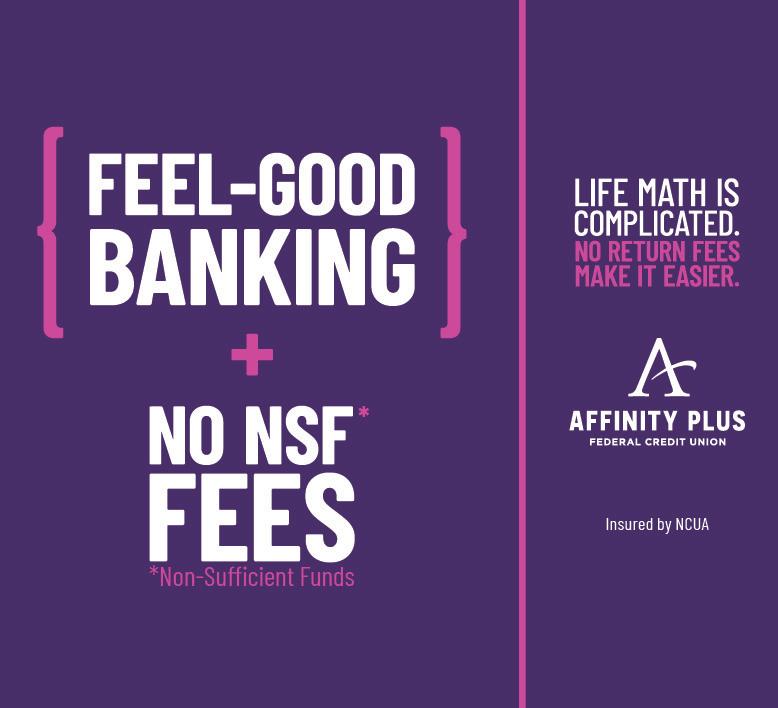
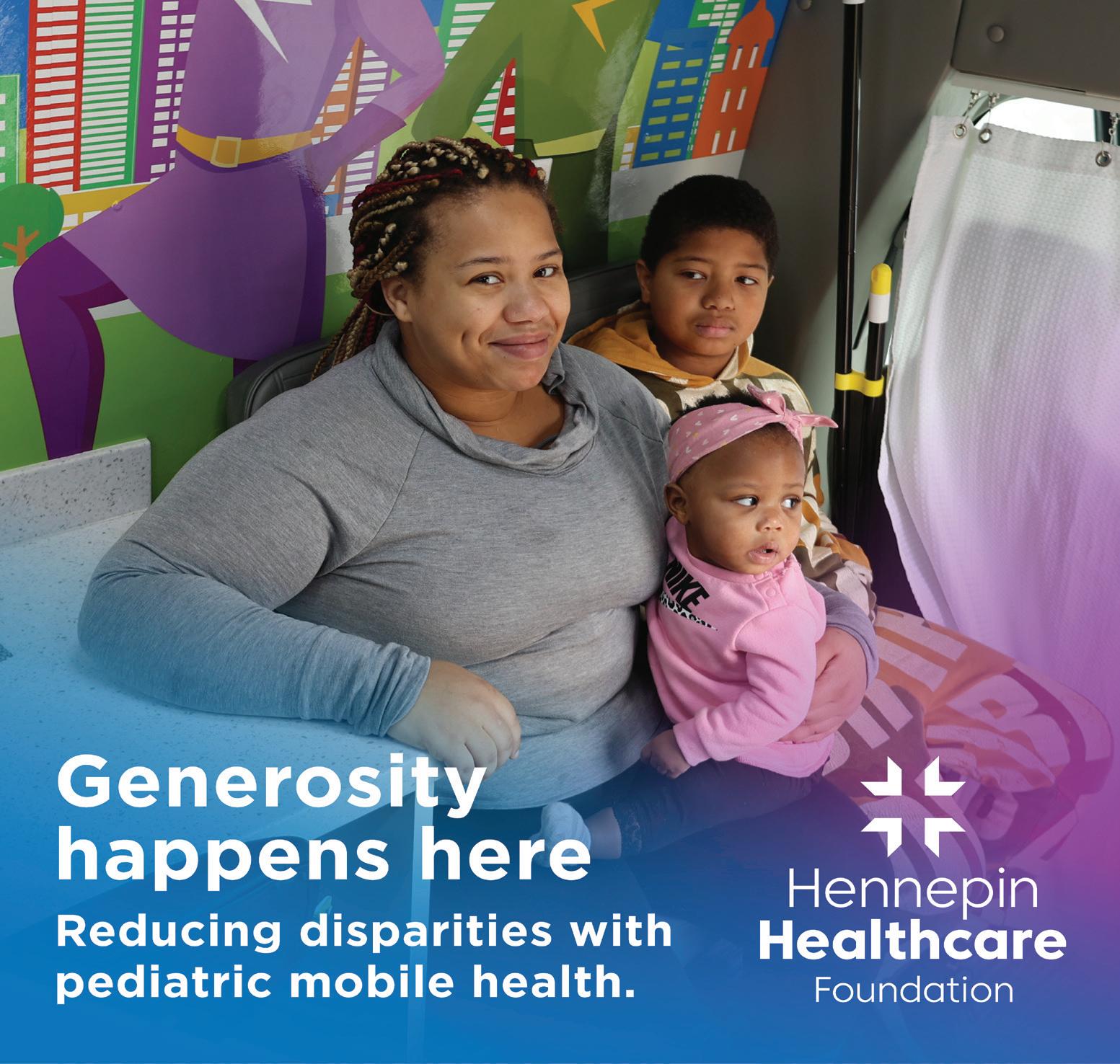
Continued from page 1
Americans,” he says. “I feel like I was on the forefront nationally with a lot of other people around the country.”
Berry is a performing artist with a couple of groups that focus on music born of the African American experience, including R&B and gospel. In the legacy of King, Berry sees music as a source of inspiration for social movements. King was famous for having musicians like Mahalia Jackson perform before his speeches.
“When he would feel like he was down, she would sing him ‘Precious Lord, Take my Hand,’” says Berry. “Even though he was not necessarily an artist, he attached himself in line with the people who were, and he benefited from the expression.”
Dr. Brittney Lewis is CEO of Research in Action. She came to the field because she felt people of color and Indigenous communities — particularly women — were more likely to be harmed than befitted by traditional research.
Lewis says each of us has a unique approach to pushing for change. “[King] was showing us a different way to activate on behalf of folks being left behind or left out,” she says. “My
Continued from page 1
sons out of state if she wanted them to survive outside of prison. She moved them to Minnesota where Bratton’s aunt and uncle lived.
“My mother moved me here October 29, 1991,” says Bratton. “On the 31st we had the Halloween blizzard, and I was upset with my mother.”
In the Twin Cities he got involved with drugs, but that changed after joining a church called Free at Last. Bratton
Continued from page 1
one’s culture of origin, reduces psychological pressure. Culture relieves us of our blindness and allows us once again to see who we are, who we have always been, and who we are meant to be.
Today, the problem of the future is a cognitive one, a problem of knowing. In the study that is my life’s work, my primary struggle is in knowing and being known not only in decisive direct visual form, but in the creator-bound knowing of who I am, and who my people are.
For the answer of who my people are I turn to historian David Blight speaking of the Jim Crow years as accompanied by the visual memorialization of the denigration of Black culture and Black people, and the uplifting of white supremacy through the monument building led by the United Daughters of the Confederacy.
The United Daughters of the Confederacy explicitly linked
medium is engaged research; his medium was the pulpit.
“Like an artist uses a paintbrush to create change, I’ve chosen to repurpose the data collection processes that have been harmful to us.”
What’s blocking progress
Large-scale, lasting impacts like King made are difficult because of changing and expanding obstacles. Pastor Donnell Bratton explains the ones he sees.
“I see these so-called leaders that the only time they have been called or moved to impact the community is when someone who doesn’t look like them, who’s sitting behind a computer, is creating a narrative that is handed to us on how we should serve each other,” he says.
Bratton came to the movement when his church, Congregation of Zion, responded to community needs exacerbated by Covid-19. He made efforts to meet the needs of a community angered and grieving over the murder of George Floyd. He says some leaders are shackled by guidelines in the form of grants to support initiatives, and many times the grants become the motive.
“They are not moved by someone who is just strung out on fentanyl. They’re not moved by some people getting evicted [from] their house. They are
was personally impacted by learning about the Poor People’s Campaign and the march for sanitation workers, especially the signs that read “I am a man.”
“He tried to get us to understand that you are a man; you’re not less than a man,”
not moved by a kid shooting another kid.”
Lewis sees obstacles in the legislative process. As she works across city, county and state governmental structures, she sees leaders working in isolation.
“We’re forced to navigate either partnering with folks or trying to change a practice or policies that exist across multiple agencies,” she says. “I acknowledge that yes, we are functioning in silos. The systems that we are often interacting with make it challenging to do it differently, but not impossible.”
In education, Berry says of King, “there was a tendency when I was growing up for educators even then to teach just the dream part but not the nightmare.” His ideas on the military-industrial complex and the challenge of balancing the warring ideologies of capitalism and democracy were often omitted.
“You see a pushback from people on the political spectrum…to try to legislate and/or run on banning books or banning Black history,” Berry says. “[They are] trying to keep people from actually learning about any of the things that King actually stood for, fought for.”
Deep connection with community
Atum Azzahir’s leadership
have a positive impact in our community.”
at the Cultural Wellness Center is inspired by King’s ability to stay connected to the communities he served.
“He stayed among the people to hear what they had to say,” Azzahir explains. “He knew the story. He wasn’t quoting something that someone had told him. He was among the people feeling the same things they felt. And that kind of connectedness with him, that didn’t break.”
This level of connectedness is essential in affecting social change. “When Dr. King died, the feeling that people had, that level of connectedness to him was like a father, a brother, a son, a husband,” she says. “I see some of that in some of the movements that are happening right now.”
people that our organizers are bringing to the table.
“That is an example of something [King] lived and breathed and practiced,” she continues. “That, I believe, is among the people today who are the frontline workers in the movement.”
Berry says the site of King’s murder speaks to his connection to the community. “All of his earnings went into the Movement,” says Berry. “The famous hotel that he was assassinated at in Memphis was not the greatest posh hotel. He was trying to be with the people.”
Moved by the spirit
Dr. Lewis urges people not to let obstacles block what they see as a path to progress.
“Don’t let someone tell you there’s only one way, because there are multiple ways.”
Azzahir says she sees efforts to make decisions with the people most affected in the room. “Even around George Floyd Square the thing that you’ll hear is that the people are being left out of the decisions,” she says. “The people who lived and had their lives there even before Mr. Floyd was murdered, those are the
“The energy that I move with [is] that if someone tells me there is only one way, I’ll show you 10,” she says. “I feel like sometimes you’re looking for permission, or accolades…instead of just putting your head down and doing something.
“Don’t let someone tell you there’s only one way, because there are multiple [ways].”
the fentanyl crisis.
“This American Dream that has been sold to us, I’m not seeing that manifested in our lives.”
Bratton says. “That’s how I started in regard to wanting to
carved monuments with their goal of teaching their people of all ages the romanticized versions of the enslaved Black “mammy” as a symbol of devotion to her Master’s family.
I was born in the Jim Crow South, and from Day 1 I was taught to speak the words of personal dignity and hope for building a better future. We were taught to memorize words such as rising, climbing, uplifting, and to be the selfdetermined image of moral instruction and intellectual excellence. Teaching spaces for memorializing image-making include beauty salons, barbershops, churches and dance joints.
For 81 years, my struggle has been to overcome, and I accept it. From outside sources, collectivities of people are often informed of their impoverishment and told that they have pain and suffering but that the pain and suffering is their fault. When this happens, the experience of pain and suffering becomes memorialized, dreams become nightmares, and dead creativity becomes collective paralysis.
I see my struggle in a broad-

In 2008, he started a church called Overcomer’s Victory. After the murder of George Floyd, his church became a community hub providing resources, from diapers to food. As he drove around the neighborhoods populated with Black and brown folks,
er context. In many teachings from many teachers across Africa, struggle brings maturity of capacity to self-regulate. The capacity to learn how to endure the throes of struggle. Struggle articulates the subjectivity of agency. Struggle awakens the great heritage of the endurance of the soul. The soul operates within a set of laws that is different from the laws governing the mind and the body.
he thought, “This American Dream that has been sold to us…[I’m] not seeing that manifested in our lives, and it bothers me.
“I responded to a call of action,” he said. He now urges the community to heed his call to recognize the fentanyl crisis as a national emergency no less than the Covid pandemic.
“I do know a grandmother that, because she had back problems, ended up being strung out on fentanyl,” he says. “Then her daughter — she was a young mother — ended up being strung out on fentanyl. And now her son, who is 17 or 18 years old, is experiencing
way forward.
My study of the life and the death of George Floyd is relevant here. Movements for human rights and human justice are framed as ground zero for understanding the human condition in the wake of slavery. In this frame, Black Freedom becomes a prophetic vision. Mr. Floyd was positioned in the immediacy of change in the world’s view of a human being on a cell phone. Through
“Historical memory is the door to the soul.”
Sam Moore, of the singers Sam and Dave, returned to our ancestors this month wearing the 89-year shroud of Blackness. Seven decades of sharing songs of overcoming limitations, Brother Sam sang and moved to the rhythms of knowing himself as” Soul Man.” Struggle calls on us to change, to transform situations. This brings about intuitive knowing, agency, and the capacity to know the
a cell phone, the lasting ancient image of a Black man with thick lips and a broad nose is memorialized.
The site of this Black man’s crucifixion is now among the most important monuments in the world. Officer Derek Chauvin posed for a photograph of his mirror image in which the world could see themselves through his learned ease of practicing the legal killing tool of “knee on the neck”
“The daughter and the son were doing fentanyl together. The son started to overdose,” he explains. “The mother called the police while the son was going into shock and left him there because she didn’t want to go to jail.”
The son survived. This family was Black. There was no public outcry.
Bratton says what would call attention to the crisis is a person in the public sphere losing a loved one. At this point, he says, “it just hasn’t impacted the right family yet.”
This past Christmas Day, St. Paul Police found a toddler un-
of a Black man. He places his hands in his pockets to show his perfect practice of this law in action.
Mr. Floyd’s living image is the haunting self-reflection for the people of the world who carry the awful terror inside their historical memory of their ancestors predesigning this practice. Historical memory is the door to the soul. I hear from allies in this movement forward to a future of harmony and their own sobering question “Who am I?”
When we attempt to imagine making freedom in the world, we are inevitably reminded that freedom in slavery’s wake on the shores of our present, we are met by the waves of our past. The destruction of a Black-anchored intellectual heritage of our people causes an awful terror because it distorts and tortures the existence of a self of origin.
Dr. Berry urges people of African descent to use creative expression — music, singing and dance — as a way of uplifting us from the oppressive feeling of our circumstances. “Not as an artist, like in terms of vocation,” he explains, “[but as] one who participates because this is something that anybody can do in terms of physical or creative expression.”
Azzahir says King teaches us to move by the spirit. “It was his nature as a person of African descent to always be aware of the spirit, the spirit guiding us, and the spiritual forces and laws in creation being the ground on which we stand.”
Bratton credits King and others like him for moving the country forward with the strength of their spiritual might. “[King] took the pen from the narrator and wrote it himself: ‘This is what I see because I live here. I experienced it myself.’
“The old civil rights leaders, they did it with nothing,” says Bratton. “And as the young people would say, they did it from the mud. They were moved because there was a supernatural spiritual, an energy that impacted them that said, ‘Go do it!’”
Vickie Evans-Nash welcomes reader responses to vnash@ spokesman-recorder.com.
responsive following a 911 call. The child, who had ingested an unidentified drug, did not survive. Both his parents were arrested.
“Where is the community at?” Bratton asks. King’s response would have been the same as for the sanitation workers, he says: “He would have made it his top priority. He would call it America’s crisis.
“We have to call it what it is. …I believe King would make it a national crisis, and he would have been addressing this like we were addressing Covid.”
Vickie Evans-Nash welcomes reader responses to vnash@ spokesan-recorder.com.
Leadership from the community is now emerging to restore the linkages between intergenerational knowledge sharing through the built communities and institutions. We can build partnerships in which cultural ways of knowing are respected as being integral to a person’s effective experiences, of keeping our roots. I propose a law and health policy to make Black healing and health happen. Health is the extent to which a person or group is able, on the one hand, to realize aspirations and satisfy needs, and, on the other hand, to change or cope with the environment. Health is therefore seen as a resource for daily life, not the objective of living. It is a positive concept, emphasizing social and personal resources, as well as physical capacity.
Elder Atum Azzahir founded the Cultural Wellness Center in 1996 and continues as the nonprofit’s executive director.
The healing and health of our memory is our way forward, a shift of mind frame from generational survival to a new consciousness. We can build cultural healing practices that revolve around creative learning and ways of producing new knowledge. Community connections and building institutions have grown distant, and in many cases, individual disinvestment is reinforced because of this distance.


1
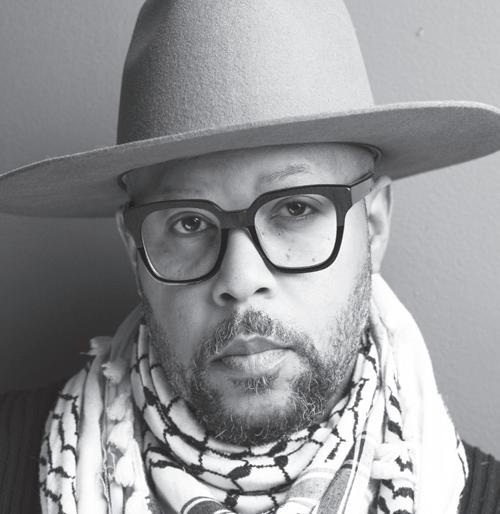
Mansfield, photographer
I’m showing up for others and giving my best self — because life offers few guarantees, and one thing is certain: Our time here is limited. So why not keep your word, show up fully, and give all you can while you can? Your legacy won’t be measured by what you have but by your impact on the lives you touch. Dr King is remembered for his impact. That’s what I’d like to be for kids and my community.
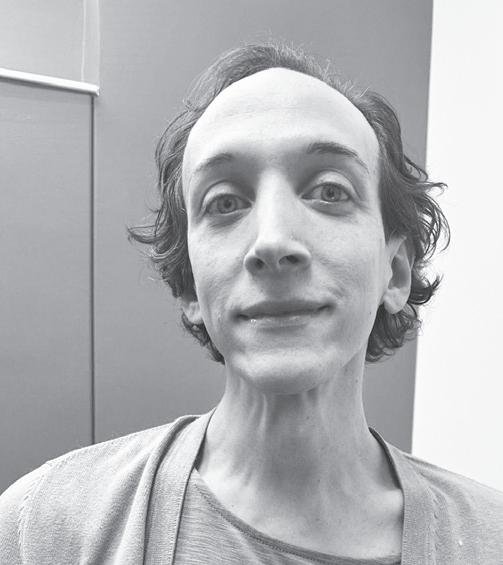
Justin Leaf,
Some of Dr King’s teachings really came through in my initial foray into activism, which actually was in animal advocacy. A lot of his teachings of nonviolence were really held high in the circles that I ran with at the time as a real sort of template for how to make change through nonviolence. And that really stuck with me. It resonated with me, and I’ve brought it with me into every facet of my life and every way I try to make change in the world.
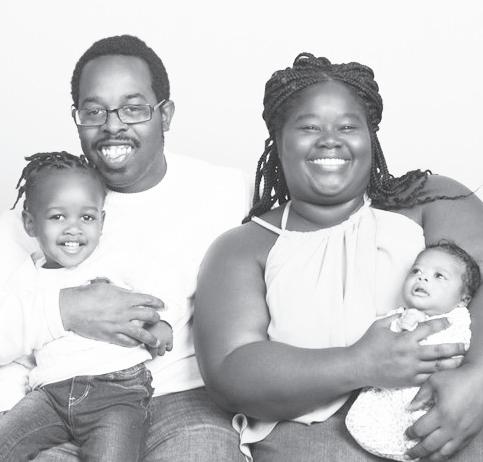
Withers-Dozier family
Having two little kids, it is important for us to not only to share, but to experience with them and celebrate our history together. We will be honoring Martin Luther King by introducing him through books and activities. But now that we have a 3-yearold, it’s important that we teach him about community as well as equality. We try to be an example and teach him to stand up for others as well as speaking up for things that are not right.
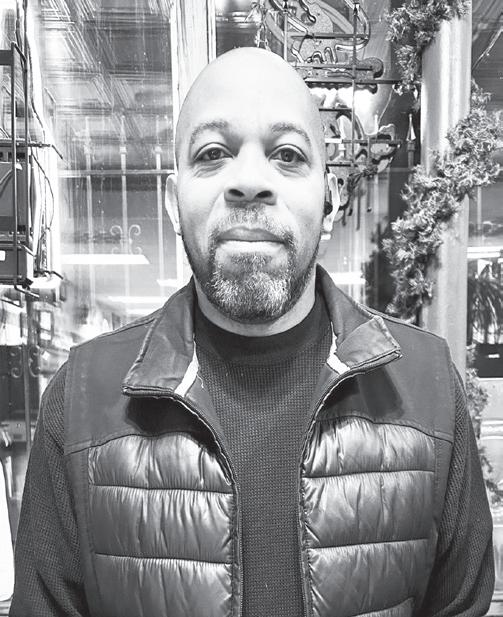
Robert Foster, Rondo resident I will start by how MLK has been impactful to me for how I grew up and where I grew up being in Minnesota. It made me a little more confident to be in orchestras and stay in orchestras when I was a kid — sometimes being the only Black male. And it helped me to be confident enough to gain those people more as friends and not somebody just to look at. It made me look at people of noncolor and accept what they were going through and listen to what they may be going through.
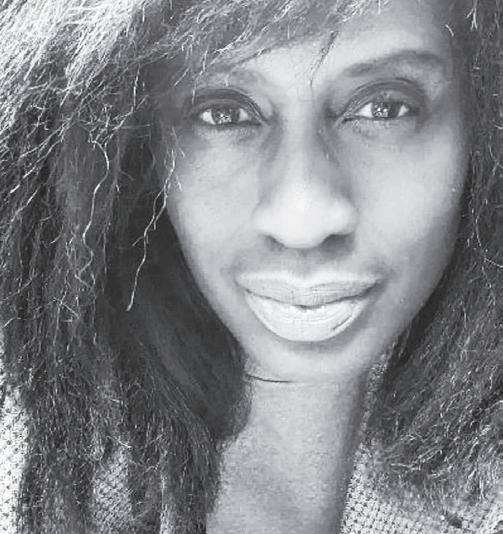
Shanneon Grimes, real estate agent
My great-uncle, the Rev. Freedie Lee Shuttlesworth, marched alongside Martin Luther King. Having that connection to one of the most powerful influencers of all times, we were raised to treat all people the same, never take for granted that we are free because we will never be free until we start recognizing that all people are created equal, and that one person is not better than you or others. This day reminds me of the fight that we still have to fight.
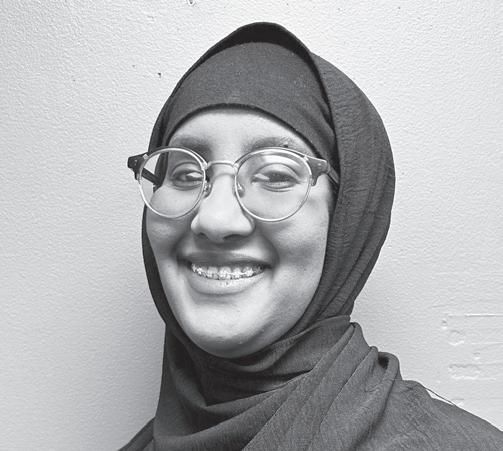
Martin Luther King means a lot to me in terms of the community work that I do every day and being an advocate for my local community members and making sure that they’re not left behind and the resources that are available to us. So I’ve come from a long career in advocacy and working with community members. A lot of the work that we do here at Cooperative Energy Futures is advocating for community members and making sure that they get their voices heard and get their power back from all these corporations and making sure that they understand that they are the ones in charge and they have the ability to speak up and be in charge.


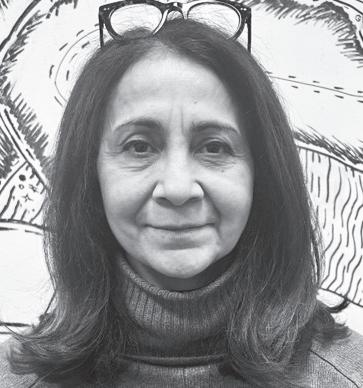
Sabina Saksena, co-founder of Smart North Martin Luther King’s legacy for me is important in two ways. I was born and brought up in India, and my working life has been in the U.S. I didn’t know until recently that Dr. King had gone to India to rechristen racism as casteism, which was very prevalent in India. So when I look at the two geographies I grew up in as a young woman, as a child, and now in my adult life in the U.S., I see the similarities in the benefits of what Dr. Martin Luther King preached. What Smart North is doing is really carrying that legacy forward of creating that agency, that level playing field, and empowering Black people and brown people in the U.S. to play successfully in the 21st-century tech economy.
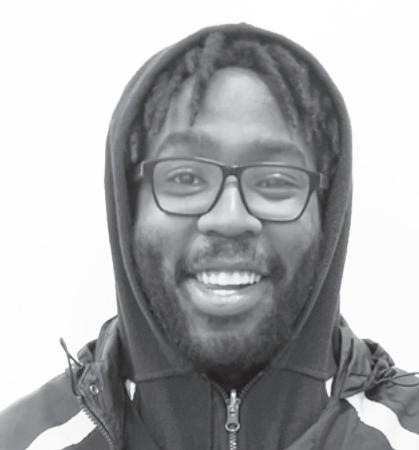
Fed
delivery driver Martin Luther King’s legacy impacts me because he talked about bringing each side together, and it has manifested now in my life. I’m 28 and have a child with a white lady, and that’s how it manifests. He wanted everyone to be equal, one person not looking down on the other person, and he wanted everyone to be a community.

As the Minnesota Spokesman-Recorder celebrates its 90th Anniversary year, you’re invited to commemorate this historic milestone by donating $90 to celebrate 90 years of continuous publication.
As a “$90—for- 90” contributor (non-business), your name will be prominently displayed in our print and digital editions until the week of Aug. 10, 2025. The paper was founded on Aug. 10, 1934.
visit our website, or email admin@spokesman-recorder.com.
Anita Alexander
Torrion Amie
Holly Andersen
Nancy L. Beals
Jonathan Beck
Clara Boykin & Family
Gretchen Bratvold
Amanda Brinkman
Toweya Brown-Ochs
Benjamin F. Bryant & Dr. Antusa S. Bryant
Deanna Callender
Shirlee L. Callender
Karl Cambronne
Liam Cavin
Janis Clay
Edward Coblentz Coventry Cowens
Alvin E. Cunningham
Michael Davis
Victoria Davis
Marie Denholm
Michael Diehl
April A. Estes
George Ewing
Elizabeth Fealey
David Fettig
Readus Fletcher
Ken Foxworth
Michael Franks
Lee Friedman
Ella Gates-Mahmoud
Kimerlie Geraci
Erick Goodlow
Leota Goodney
Karlene Green
Pamela Hall-Clemens
Charles Hallman
Jeana Hamm
Hendon Group, Inc
Maxine & Kieran
Hughes
Ellen Guettler & Ben Pofahl
Colnese Hendon
Connie Hudson
Angelo Hughes
Andrew Issacson
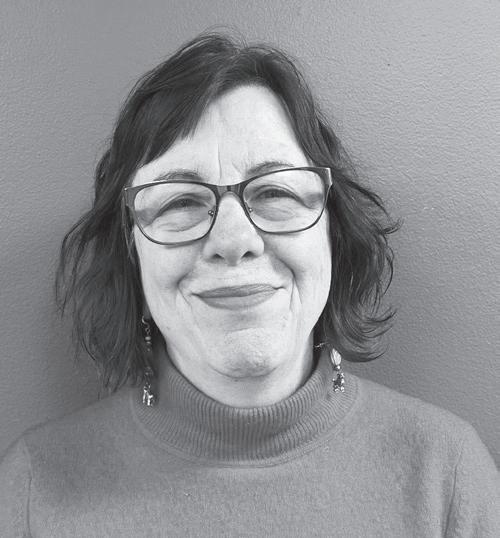
Kyle Samejima, community outreach and engagement manager, Cooperative Energy Futures
The legacy of King’s work personally has shown me what leadership can do to shift deeply entrenched, oppressive, toxic systems and ideologies and move them through the lens of love and power and collaboration to get through the new systems. And it is more also that inspiration that he brought, that things that seem impossible can be done. We’re still in the midst of that work every day in our country and around the world. CEF was founded to address systems that were unfair, oppressive, extractive, and created a new system of energy that is cooperatively owned by community members, accessible to all community members regardless of income, regardless of whether you own or rent your home, and shifting the story, creating a new story of who gets to own and benefit from renewable energy.
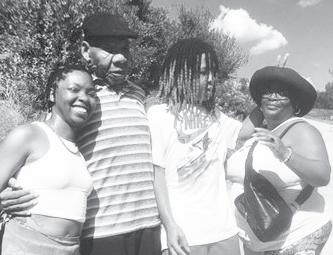
Chantel Harlen, author and poet I will be celebrating with all the generations of my family and attending Black programming to honor our leaders. My grandpa always shares stories of his upbringing, he is 82. I am thankful to the young, Black, and gifted, and raising my son to see his rich heritage.
Katie Izzo
Ms. Jewelean Jackson & Sir Steven C. Davis
Nina Johnson
Clarence Jones
Debra Jones
Shirley R. Jones
Julie July
Cynthia Kelly & Murry Kelly Jr.
Nathaniel Khaliq
Zena Kocher
Jimmy Lewis
Lisa Lissimore
Michele Livingston
Harlan Luxenberg
MRPP and Associate Communications
Melanie Manaen
Rose McGee
Peter McLaughlin
Kyle Meerkins
Deborah Montgomery
Debbie Morrison
Marcia Murray
Mary K. Murray Boyd
Dan Ness
Sanda Noy
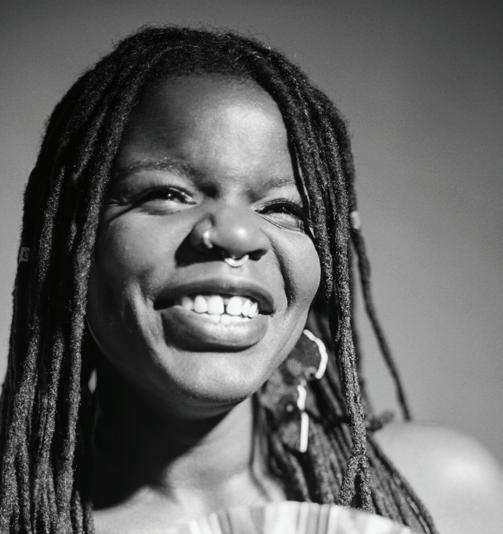
Felicia Perry, ARTrepreneur, economic development leader with Rondo Land Trust Dr. King’s question, ‘What are you doing for others?’ is one I reflect on daily. My work spans economic development, wellness, and collective care, all aimed at fostering thriving and resilient communities. Whether I am leading yoga and meditation sessions to support community healing, facilitating spaces for creative entrepreneurs to turn their passions into sustainable livelihoods, or mentoring emerging leaders, my commitment is rooted in centering equity, justice, and shared prosperity. Through wellness practices like yoga, breathwork, and mindfulness, I help communities build resilience and prioritize self-care as a revolutionary act. These practices echo Dr. King’s belief in cultivating inner peace and emotional discipline as part of nonviolent resistance. His teachings on forgiveness, hope and love as pathways to freedom remind us that mental wellness is not only personal but deeply connected to how we engage with others.
Dr. King also acknowledged the psychological toll of systemic injustice. In his 1967 speech “Where Do We Go From Here?” he spoke of the importance of instilling dignity and self-worth in communities burdened by oppression. His vision of the Beloved Community inspires me to curate spaces where people feel seen, supported and valued, fostering both individual and collective healing.
The O’Neill Family
Minister Dr. Ni Ora Hokes
Liz Oppenheimer & Jeanne Burns
Tamara Pollard
Ray Seville Productions
Mary Quinn McCallum
Dr. Mitchell Palmer
McDonald
Heidi Pemberton
Amy Pfankuch
Patty Ploetz
Mark Ritchie
Lyn Rabinovitch & John Saxhaug
Augustus Ritemon
Carolyn Roberson
Winthrop & Barbara Rockwell
M. Rebecca Ross
St. Paul Saints
Anura Si-Asar
Floyd Smaller
Chanda Smith Baker
South Hill Film
Ronald Spika
Stan Sandiford
Cyriaque Sukam
Timothy Sullivan
Heidi Swank
Dotty Timmons
Nicholas Upton
Jason Walker
Dr. Betty Webb
Bill Wells
Tracy Wesley
Jeffery Young
By Margaret Sullivan Contributing Writer
The Children’s Theater Company is known for bringing stories to the stage that exemplify their core values: imagination, excellence, respect and inclusion. This month, CTC welcomes a play that does just that, using the magic of puppetry and cinematography to bring a classic tale to life.
“Leonardo! A Wonderful
Show About a Terrible Monster” tells the story of a monster named Leonardo who cannot scare anyone no matter how hard he tries. This causes Leonardo to be teased by his fellow monsters, motivating him to go on a quest to find the world’s most “scaredy-cat” kid.
Members of the audience will question in anticipation whether Leonardo finds someone to scare, or if he finds something even better that he wasn’t expecting. The performance, created by Manuel Cinema, is inspired by the books “Leonardo, the Terrible Monster” and “Sam, the Most Scaredy-Cat Kid in the Whole World” by Mo Willems.
“Leonardo is about empathy and seeing the people around you and what they need,” says Manuel Cinema’s Co-Artistic Director Sarah Fornance. “It is also about not being or doing
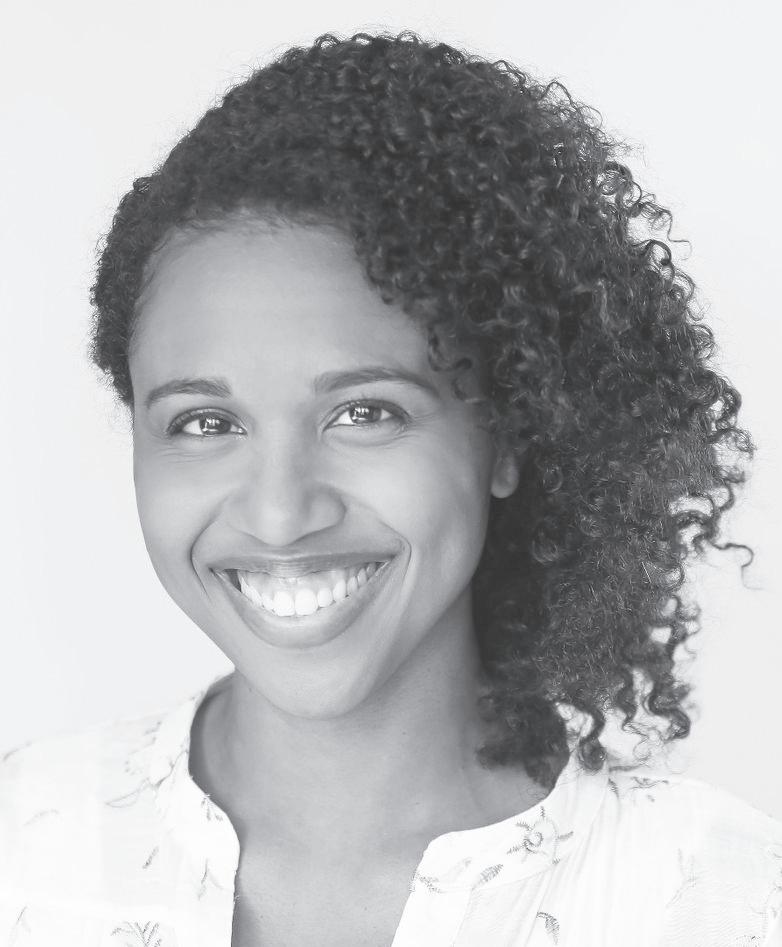
what society at large expects. I am a huge Mo Willems fan, so when he asked if we could adapt these two books I was beyond thrilled.” Manuel Cinema is an Emmy Award-winning film and video production company, design studio, and performance collective based in Chicago known for giving audiences an inside look into how its shows
come together.
“We show the making of the show as it happens,” says Fornance. “There is a big screen onstage and live cameras. We move around paper puppets in a binder to make what looks like an animated movie, like the pictures in the book are coming to life.”
Leah Casey plays several of the characters in the show,

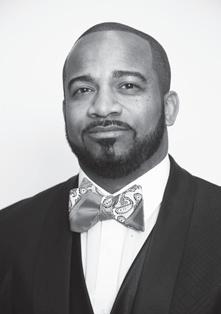

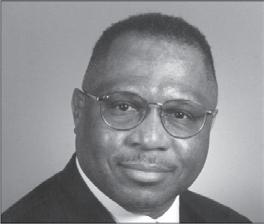
including Kerry, who Casey describes as a big “scaredy cat” striving to push past her fear and take risks — something Casey can relate to.
“I enjoy playing her because she manages to overcome her fear of just about everything to make a new friend. It’s kind of relatable, as I have a difficult time meeting new people, too. Introvert to the max.”
Casey is a Chicago-based actress, artist and dancer. She shares Fornance’s enthusiasm for Williems’ storytelling and ability to encourage children to tap into their emotions.
“When on stage, we have to portray big emotions in big ways for the audience to see,” Casey said. “He writes characters that are already trying
director & director of equity and community partnerships.
Winn oversees the development of new plays and chooses what audiences see on stage each season. He also leads and develops the theater’s “ACT One Vision,” which ensures that the company upholds its values of creating an inclusive and diverse environment.
ers and sticks and run around making their own puppet shows and their own movies,”
Fornance says.
“The show is funny, joyous, sad and scary. The live music and songs are all total jams. We hope that people of all ages go on an emotional journey, laugh, have fun, and leave humming the tunes from the show.”
“Theatre has been guilty of racism, classism and bias. Our vision is to not only recognize these injustices but to work to change them on an institutional level.”
Wonderful Show
“Leonardo!
“I promote and foster CTC’s commitment to justice, equity, diversity, inclusion and be-
About a Terrible Monster” runs through March 9. For more infor-
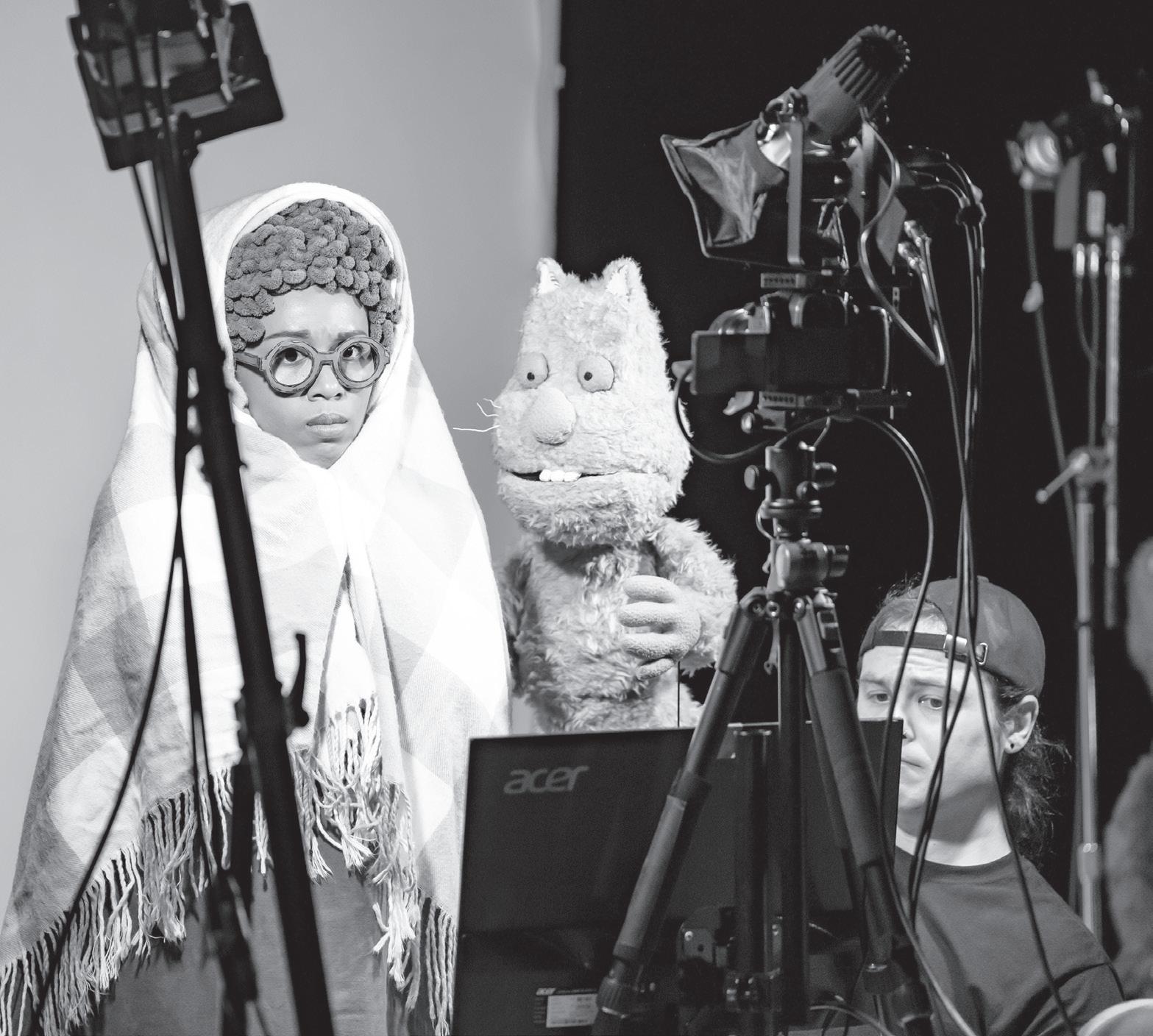
to convey big emotions; they translate well to the stage.”
The CTC intentionally welcomes plays such as “Leonardo!” that encourage children to show empathy, celebrate differences, and recognize the commonalities that bring us together. “At CTC we believe that theatre is an amazing tool that helps us realize our common bonds and illuminate our connections,” says Michael Winn, CTC’s associate artistic
longing,” Winn says. “Theatre has been guilty of racism, classism and bias. Our ‘ACT One Vision’ is to not only recognize these injustices but to work to change them on an institutional level.”
Audience members can expect to go on an emotional rollercoaster ride and leave inspired to tell their own stories through film and puppetry.
“We hope that this inspires them to grab paper and mark-
mation, visit childrenstheatre.org.
An hour before all Thursday 7 p.m. and Sunday 5 p.m. performances, audiences can join in on pre-show activities led by CTC teaching artists. Following all Friday 7 p.m. performances, audiences can stay after to meet some performers and have their program autographed.
Margaret Sullivan welcomes reader responses at msullivan@ spokesman-recorder.com.

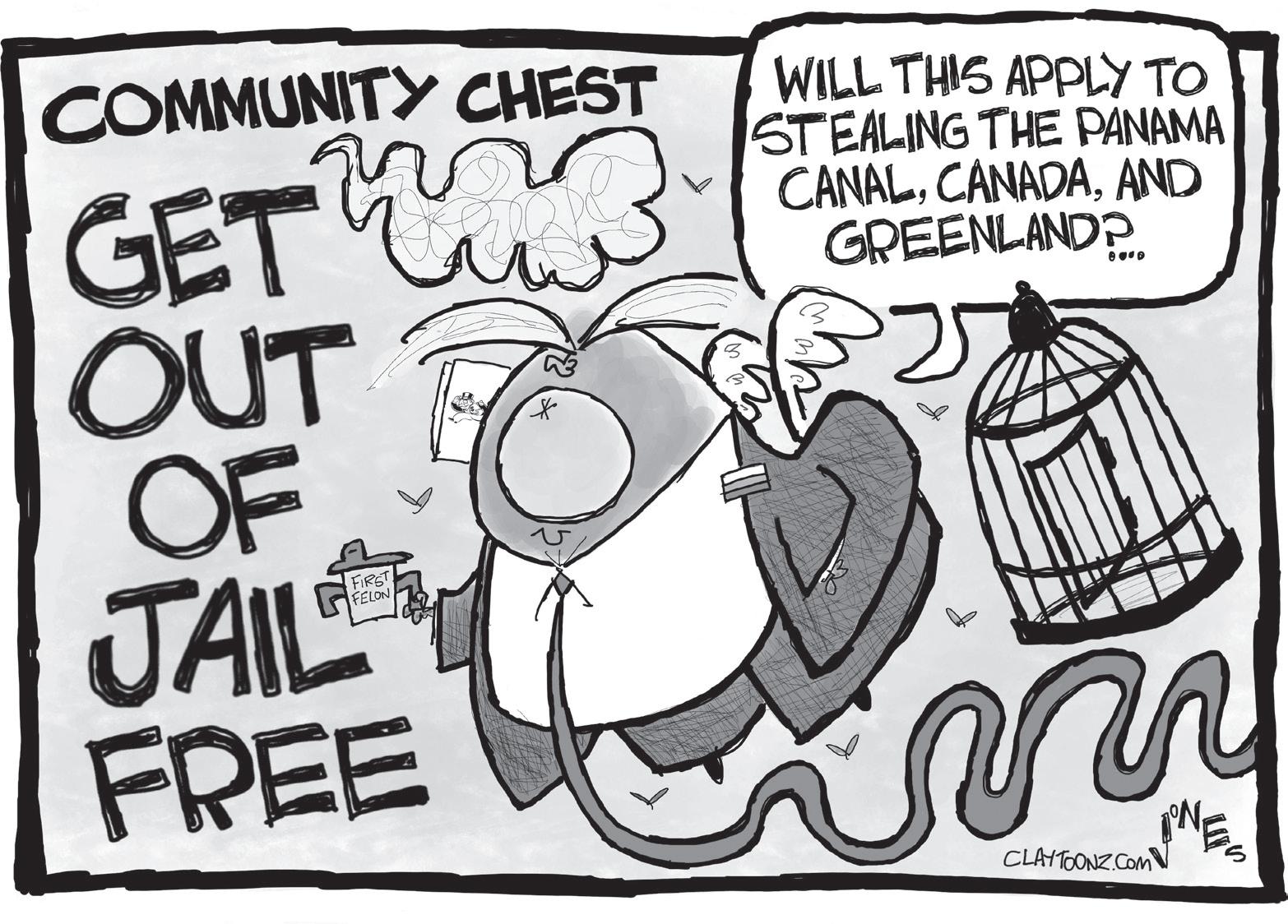
By Olivia Harvey
A few years ago my daughter Maliya was six years old and had just started kindergarten after graduating from the Children First Head Start program. It was hard to believe we’d reached this major milestone, but with the love, care and guidance she received from her teachers, I’m confident that she will continue to thrive.
Children First and the Head Start program have always been close to my heart and the hearts of my family. My husband, Malik, is a Head Start graduate committed to our shared mission of raising the healthiest, happiest family possible.
time offering me the flexibility to be a mom.
Children First was offering a Job Skills Training Course as part of the agency’s Family Strengthening services. The class was perfect because it provided a sense of accountability and belonging. I learned about identifying and overcoming obstacles related to employment, and there was a special focus on resume writing, interviews, and “acing” the first 90 days at a new job.
to be a working professional, a full-time mom, and now a student, but I’m not stopping there. I would like to earn my master’s degree and work as an administrator, with one of my ultimate goals being to run for the school board.
By Ben Jealous
Reflections on God are common right now. With 2024 virtually certain to be the hottest year on record, some may look at the symptoms of the climate crisis — the extreme heat, the fires and floods, the climate-charged cyclones — as signs of God’s wrath.
Whether you believe in the Bible, the Torah, the Quran, or are an atheist, we can all agree there is a moral imperative to address the climate crisis. After all, it kills people and destroys lives. The cause of the climate crisis — the burning of fossil fuels — is also responsible for plenty of death and destruction.
Donald Trump’s choice for Secretary of Energy Chris Wright and one of his picks to co-lead the so-called Department of Government Efficiency (DOGE) Vivek Ramaswamy seem to have a different message, one that turns the concept of morality on its head and distorts reality.
Wright has invented a warped “moral case” for the rampant extraction and burning of fossil fuels. He portrays fossil fuels like oil, gas and coal as virtuous. He has even called goals to reduce greenhouse gas emissions “perverse.”
What he leaves out is that the current and future American economy is powered by clean energy. The clean energy revolution is behind the rebirth of American manufacturing and is lifting people out of poverty. The jobs created pay well
and are safer. Consumers are saving money with renewable clean energy sources like solar and wind because they are now both more resilient and less expensive to produce than fossil fuels.
And if we want to talk poverty, what about the countless families that have been bankrupted and sent into poverty because of pollution, fossil fuel leaks and explosions, and unbearable health care costs to treat the diseases fossil fuels cause? Or the extreme weather disasters we see ravaging communities with increasing frequency and intensity?
Ramaswamy said last year, “The reality is more people are dying of bad climate change policies than they are of actual climate change.”
It is a claim utterly backward, even Orwellian. The New York Times fact-checked the statement and correctly rated it “false” with “no evidence to support this assertion.” To pretend there is a moral case for fossil fuels requires more than mental gymnastics. It requires willful dishonesty.
into focus today.
In the Book of Genesis, God charged people with being stewards of the Garden of Eden. He told Adam and Eve to cultivate and care for it. This early commandment recognizes nature — also known as God’s creation — as something to be grateful for and respected.
Going back to the beginning, God gave us the means to our salvation or our demise. He gave us free will — along with His many commandments was the free will to choose whether or not to follow them. The other thing God gave us was fire.
Ultimately fire became electrical power. But it was the tool that allowed humanity to thrive, to give us light in the dark and warmth in the cold.
So, the energy we needed for warmth, light, and eventually transportation came from burning things. And what people burned were the things that were most readily accessible and easy to harness — starting with wood, then oils from animals and trees, then coal, then petroleum and so on.
Our lives center on family; in addition to Maliya, we have two other children, sons Jeremiah and King. When we had our kids, we knew we didn’t have to look far to find quality, affordable child care with amazing teachers we could trust.
Through Head Start, I also found support personally and as a parent. Due to the pandemic, I had reduced hours and was forced to seek other employment. During this time, I needed something that would allow me to feel professional and help me keep my skills up while at the same
Head Start’s promise is simple: Every child, regardless of circumstances at birth, can reach their full potential.
I was offered a position at Sarasota School of the Arts & Sciences, where I have been working as a paraprofessional. While working full time, I’ve also had the opportunity to go back to school to earn my bachelor’s degree to become a teacher.
My ambitions have led me
Because of Children First, Head Start, it feels like a whole new world of possibilities has opened. Although we still face unique challenges, I feel grateful and am so proud of how far we’ve come. Because Malik and I were able to grow and thrive in a healthy environment at the earliest stages of our lives, the lives of our children have been transformed for the better.
Head Start is a changemaker for all communities. Child by child, family by family, the seeds that are sowed continue to blossom as they stretch higher and higher toward the sunshine. Their promise is simple: Every child, regardless of circumstances at birth, can reach their full potential.
As I look to the future — from my youngest child thriving to earning my teaching degree — I know that thanks to Head Start there is nothing to fear.
Olivia Harvey is a Head Start parent, Policy Council member, and alumna.
‘Death by incarceration’ reaches record levels in the U.S.
By Stacy M. Brown
The Sentencing Project, an advocacy organization promoting humane responses to crime, has released its report, “A Matter of Life: The Scope and Impact of Life and Long-Term Imprisonment in the United States.” The report provides a detailed analysis of life sentences, revealing that nearly 200,000 people — one in six individuals in U.S. prisons — are serving life terms.
committed before the age of 25, 62% are Black.
The report also draws attention to the growing number of elderly individuals serving life sentences. Nearly 40% of the life-sentenced population is aged 55 or older, many of whom entered prison decades ago.
But let us look to scripture. It is as good a place as any to start, since the Bible and its lessons help guide so many people’s idea of morality. In it, God gave us a formula that certainly seems to be coming

submissions@spokesman-recorder.com submissions@spokesman-recorder.com submissions@spokesman-recorder.com. ads@spokesman-recorder.com
Over the eons, as the number of people increased exponentially, the accessibility of these finite sources began to shrink exponentially. Whale species were hunted to the brink of extinction for their oil. Island nations and huge swaths of the continents were deforested.
For a long time, we thought the answer was to replenish the finite things to burn as best we could. But along the way, we realized God gave us infinite sources of energy that had always been abundant: the sun and the wind. We realized the terrible cost of burning through finite sources was not simply running out of things to burn, it was extreme weather and our planet becoming ever less hospitable due to warming.
The signs all pointed to the need to make the switch from the finite sources of energy — and the destruction they cause — to the infinite sources, which are kinder both to people and to all of God’s creation. We can power our world and tend the Garden at the same time.
In the Bible, when humans finally understood the message
The United States accounts for 40% of the world’s lifesentenced population but represents only 4% of the global population.
Life without parole, often referred to as “death by incarceration,” has reached record levels in the United States. The report found 56,245 individuals serving life without parole in 2024, a 68% increase since 2003.
Another 41,398 individuals are serving virtual life sentences, which require at least 50 years in prison before release eligibility. Researchers noted that overall crime rates have reached near historic lows, yet incarceration rates persist.
Nearly half of those serving life sentences and more than half sentenced to life without parole are Black. In seven states, more than one in four Black individuals in prison is serving a life sentence.
The disparities are particularly stark among younger populations, with 70,000 individuals currently serving life sentences for offenses committed before the age of 25. Among those sentenced to life without parole for crimes
The Sentencing Project’s researchers claimed that the aging process in jails, together with the lack of access to health care, makes this demographic even more vulnerable. They said the fact that more than half of those serving life sentences in Michigan are older than 55 highlights the structural issues with aging confinement.
Research cited in the report challenges the idea that extreme sentences serve as a deterrent. The authors assert that the severity of punishment has little impact on reducing crime, noting that most individuals serving life sentences have “aged out” of criminal behavior long before their sentences end.
“Communities will not be safer unless we build stronger public health, education, and services for vulnerable people,” said Kara Gotsch, executive director of the Sentencing Project. “The release of elderly and rehabilitated people from prison will not impact crime rates but will reserve public dollars for more effective safety solutions.”
The report argues that resources currently spent on imprisoning elderly and rehabilitated individuals would be better used addressing the root causes of crime, such as poverty and lack of access to education and health care.
The report also critiques the United States’ approach to life imprisonment compared to international standards. Life sentences are rare in most countries and typically capped at shorter durations. The study calls on U.S. policymakers to adopt reforms that reflect a more humane and practical approach to justice.
Among those sentenced to life without parole for crimes committed before the age of 25, 62% are Black.
Stacy M. Brown is an NNPA Newswire senior national correspondent.
The Sentencing Project provides several recommendations, including abolishing life without parole, implementing sentence reviews after 10 years of incarceration, capping sentences at 20 years for adults and 15 years for youth, and reforming parole systems to ensure fair evaluations. The report’s authors concluded that reducing excessive sentences would promote fairness and redirect public funds toward effective community safety measures.
STATE OF MINNESOTA
HENNEPIN
Bayron Josue Vicente Diaz,
Petitioner, Judge:
Couri Referee: Holly B. Knight
And Maria M. Diaz Delgado and Fernando F. Ortega Elias, Respondents. SUMMONS FOR THIRD-PARTY CUSTODY (CHC602) MINN. STAT. CH. 257C
TO THE ABOVE-NAMED RESPONDENTS: IMPORTANT NOTICE
The Petitioner has filed a lawsuit against you to ask for custody of the following children: Delmy Josefina Ortega Diaz (DOB 8/28/2006) Henry Danilo Ortega Diaz (DOB 8/10/2008)
This Summons is an official document that affects your rights, even if it does not have a court file number listed. Read this Summons and the attached Petition carefully. If you do not understand something in these documents, contact an attorney for legal advice.
1. The Petitioner has filed a lawsuit against you asking the Court to give Petitioner custody of the minor children.
2. You must serve upon the attorney for Petitioner and file with the Court a written Answer to the Petition, and you must pay the required filing fee unless it is waived by the Court.
3. You must serve your Answer upon the attorney for Petitioner within 21 days of the date you were served with this Summons, not counting the day of service. If you do not serve and file an Answer, the Court may decide custody and give Petitioner everything they are asking for in the attached Petition
Date: January 2, 2025
By s/SandraS.Smalley-Fleming
Sandra S. Smalley-Fleming FREDRIKSON & BYRON, P.A.
60 South Sixth Street, Suite 1500 | Minneapolis, MN 55402 T 612.492.7497 | ssmalleyfleming@fredlaw.com
AttorneyforPetitionerBayronJosueVicenteDiaz
Minnesota Spokesman-Recorder January 16, 23, 30, 2025
INVITATION FOR PROPOSALS
Sealed proposals to provide LANGUAGE INTERPRETATION AND TRANSLATION SERVICES, Contract No. 25-144, will be received by the Public Housing Agency of the City of Saint Paul, 555 Wabasha St. N. Suite 400, Saint Paul, MN 55102-1602 until 4:00 PM CST on January 31, 2025.
Proposals may be submitted electronically, in a pdf format, to Northstar imaging, www.northstarplanroom.com, or sealed proposals may be sent to:
Public Housing Agency of the City of St. Paul, Attention Mai Moua, 555 Wabasha St. N. Suite 400, St. Paul, MN 55102-1602 by January 31, 2025, at 4:00PM CST to be considered.
A complete set of proposal documents is available through Northstar Imaging at www.northstarplanroom.com under Language Interpretation and Translation, Contract No. 25-144. Digital downloads are at no charge, hard copy price is per the plan room.
A pre-proposal conference shall be held on January 21, 2025 at 10:00AM CST via Teams. Contact Mai Moua at mai.moua@stpha.org by January 17, 2025, 4:00 pm Central time for Teams invite. Questions arising from this pre-proposal conference will be addressed by addendum, if necessary.
The PHA reserves the right to reject any or all proposals or to waive any informalities in the bidding process.
AN EQUAL Mai Moua OPPORTUNITY AGENCY mai.moua@stpha.org (651) 292-6086
Minnesota Spokesman-Recorder January 16, 2025
UNRIVALED
Continued from page 9
who played for Staley at South Carolina, “I think it just shows how much she truly wants to continue to invest in women’s sports. It’s always amazing just having her as a coach, as a mentor, definitely as an investor in something like this.”
The 2025 AU season will be played in Nashville for the first time.
Unrivaled and AU both are riding on the current popularity wave that women’s sports are enjoying, especially basketball. “I think over the last recent years you’ve seen our game grow tremendously, not just in professional but college as well,” said Hamby. “I think people are really starting to recognize the talent level of us and college players as well.
“People are starting to invest in our trajectory, which is on the up and up,” said the LA forward. “We’re still continuing to improve and get better. I think it’s great for what it’s doing for the W, for col-
lege basketball, and women’s sports in general. It’s only gonna get better from here.”
Four of the six Unrivaled coaches are Black, including Teresa Weatherspoon. “I love her,” admitted Hamby on T-Spoon, a former WNBA player and coach, and HOF.
“I love her energy. I think that was the first thing when we got on the court — her energy was just amazing. It makes you want to just play hard and give it your all.”
Finally, sistahs also will be involved in the Unrivaled telecasts. W legends Candace Parker and Renee Montgomery will be in the studio, with special appearances by fellow legend Lisa Leslie. A rotation of veteran reporters will include Taylor Rooks, Stephanie Ready and Roz Gold-Onwude.
More than 45 primetime regular season games will be shown live on TNT and truTV, along with all games streamed on Max.
Charles Hallman welcomes reader comments to challman@ spokesman-recorder.com.
Failure
From Ads Department/MN Spokesman-Recorder
PHONE: 612-827-4021
FOR BILLING INQUIRIES & TEARSHEETS
PLEASE CONTACT
ACCOUNTING DEPT
BILLING@SPOKESMAN-RECORDER.COM
SUMMONS
3 WEEK RUN FLAT RATE: $320
Please Note: New email address for all future ads is ads@spokesman-recorder.com
The MSR handles billing digitally. This means you will get e-tears and e-mailed invoices unless you specifically request a hard copy.
State of Minnesota District Court Ramsey County Second Judicial District Court File Number: 62‐HR‐CV‐24‐1021 Case Type: Harassment
Shakur Brown vs Amira Weems Notice of Issuance of Harassment Restraining Order by Publication To Respondent:
YOU ARE NOTIFIED that a Harassment Restraining Order has been issued on August 13, 2024.
A hearing has not been scheduled. You may request a hearing on this matter by filing a RequestforHearing
Failure
PHONE: 612-827-4021
Continued from page 10
FOR BILLING INQUIRIES & TEARSHEETS
under Johnson.”
From Ads Department/MN Spokesman-Recorder
PHONE: 612-827-4021
FOR BILLING INQUIRIES & TEARSHEETS PLEASE CONTACT ACCOUNTING DEPT BILLING@SPOKESMAN-RECORDER.COM
LEGAL NOTICES FLAT RATE: $110.00
Please proof, respond with email confirmation to ad@ spokesman-recorder.com. For more exposure: We are also inviting our clients to advertise on our web site weeks for a flat fee of $150 per position with purchase print ad.
The MSR handles billing digitally. This means you will get e-tears and e-mailed invoices unless you specifically request a hard copy.
Please proof, respond with email confirmation to ad@ spokesman-recorder.com. For more exposure: We are also inviting our clients to advertise on our web site weeks for a flat fee of $150 per position with purchase print ad. The MSR handles billing digitally. This
Continued from page 10
PLEASE CONTACT ACCOUNTING DEPT BILLING@SPOKESMAN-RECORDER.COM
but how am I impacting the young women in my care.
“That’s always going to be first and foremost, and the decision-making that we do that goes into this program — how am I using my position and my role as head coach to grow teenagers into young women?”
LEGAL NOTICES SIZE: 2 COL X 4” RATE: $18.10 PCI (1ST RUN)
SUBTOTAL: 144.80
But his teams haven’t quit on him. From covering sports for over four decades, I know what it looks like when players quit on a coach, especially during losing times. This isn’t happening under Johnson’s watch.
games ultimately were the tipping points in her final decision for school, continued Gardner.
always some ups and downs,” she noted. “But I think something that really stood out to me was how close our team was. They talked about [that] during my recruiting process, about how close they were.
Despite her comments, which made it both in print and on social media, there has been much speculation on the veteran coach’s decision and what really happened without fully reporting both sides.
Rutgers also has been in rebuilding mode since Washington was hired in 2022. Like Johnson, her players haven’t quit on her despite the distracting internal turmoil currently surrounding the squad.
“It means a lot being close to home, being able to keep that connection with my family and stuff, being able to be home for Christmas and Thanksgiving when you get a couple days off.”
Please proof, respond with email confirmation to ad@ spokesman-recorder.com. For more exposure: We are also inviting our clients to advertise on our web site for 2 weeks for a flat fee of $150 per position with purchase of print ad.
The MSR handles billing digitally. This means you will get e-tears and e-mailed invoices unless you specifically request a hard copy.
We talked to Washington last week after her club played Minnesota Jan. 8.
“When you’re dealing with so many different personalities, different teenagers, you got to constantly keep things moving,” stated the thirdyear Rutgers coach, now in her 15th season overall as a head coach.
Unfortunately, both Johnson and Washington are guiding teams that are struggling this season. Both squads weren’t favored to win the 18-team Big Ten anyhow but instead to finish in the lower division.
In Johnson’s case, the fourth year Gopher HC virtually has dealt with an overhauled roster each year in this NIL-transfer portal age.
“Even after a 19-win turnaround NIT season, Johnson’s name resurfaced in coaching hot seat lists this year,” continued a Star Tribune article last week. “Criticism is growing from some Gopher fans about the present struggles
Still, the announcers during the Jan. 5 televised game mumbled aloud why the freshman player wasn’t playing, almost taking sides without fully finding out why.
Both Johnson and Washington are more than capable coaches. Constructive criticism is one thing, but putting out ill-timed jottings in order to get likes, page views, and other attention is dangerous.
Washington’s Jan. 5 postgame comments should be required viewing for all fans and media on what a college coach’s job truly is in the current “me-first” sports landscape.
Michigan State Head Coach Tom Izzo has told me several times how impressed he is with the job Johnson is doing and is a huge supporter of the Minnesota coach. Therefore, once again I must root, root, root for such Black coaches as Johnson and Washington, even if I’m a one-man band in this regard.
“You always supported us well,” Washington told me. “I appreciate that.”
Charles Hallman welcomes reader comments to challman@ spokesman-recorder.com.
The 5’10” Gardner is the only Black freshman on this year’s Tommies women’s basketball team. She formerly starred at Eastview and North Tartan AAU team, a member of the 2022 16U National Championship and the Minnesota AAU State Championship teams.
Thus far no regrets, said Gardner.
“I think one of the biggest things that stood out to me at St. Thomas was how much they care about who you are as a person outside of the athletics, and just setting you up for the most success you can after you get done with these four years,” she said.
Expectedly, Gardner is experiencing a typical first year in college, adjusting to the double lifestyle of being a student and a student athlete, finding the right balance in both worlds.
“I think there’s definitely

“A lot of teams say that but don’t truly feel that way,” said Gardner. “But I truly feel like we are a close team, and I like they’re always willing to help me out when it comes to school or getting extra shots up or anything like that.” Gardner is hoping to go into medicine after her college days: “I want to become a veterinarian. Right now, my plan is to major in bio. Hopefully I can get into the U of M for grad school.
“I’ve always just loved animals, especially since I was little. It’s just always been a dream of mine.”
UST is now in conference play. The team is not off to a great start but is working to improve on that as the season goes on. The Tommies this week play at Oral Roberts (Jan. 16) and Omaha (Jan. 18).
“Just to continue to get better day by day,” concluded Gardner on her personal goal as well as the team’s. “Continue to get better, just staying together and stay connected.”
Charles Hallman welcomes reader comments to challman@ spokesman-recorder.com.
By Charles Hallman Sports Columnist
nrivaled, the new 3-on-3 women’s pro basketball league, begins play this Friday, Jan. 17. It is one of two off-season domestic opportunities for WNBA players to get their game on without going overseas: Athletes Unlimited (AU) begins its fourth season Feb. 5.
While Unrivaled is completely stocked with WNBAers, AU is a traditional five-on-five league with 40 W and non-W players participating without coaches and rotating team captains redrafting players each week.
The Unrivaled games will be played on Fridays, Saturdays and Mondays over a twomonth period on a 70-by-50 foot compacted full court. A round-robin schedule is set, and the top four teams will advance to the playoffs. All games are scheduled to be played in Miami.
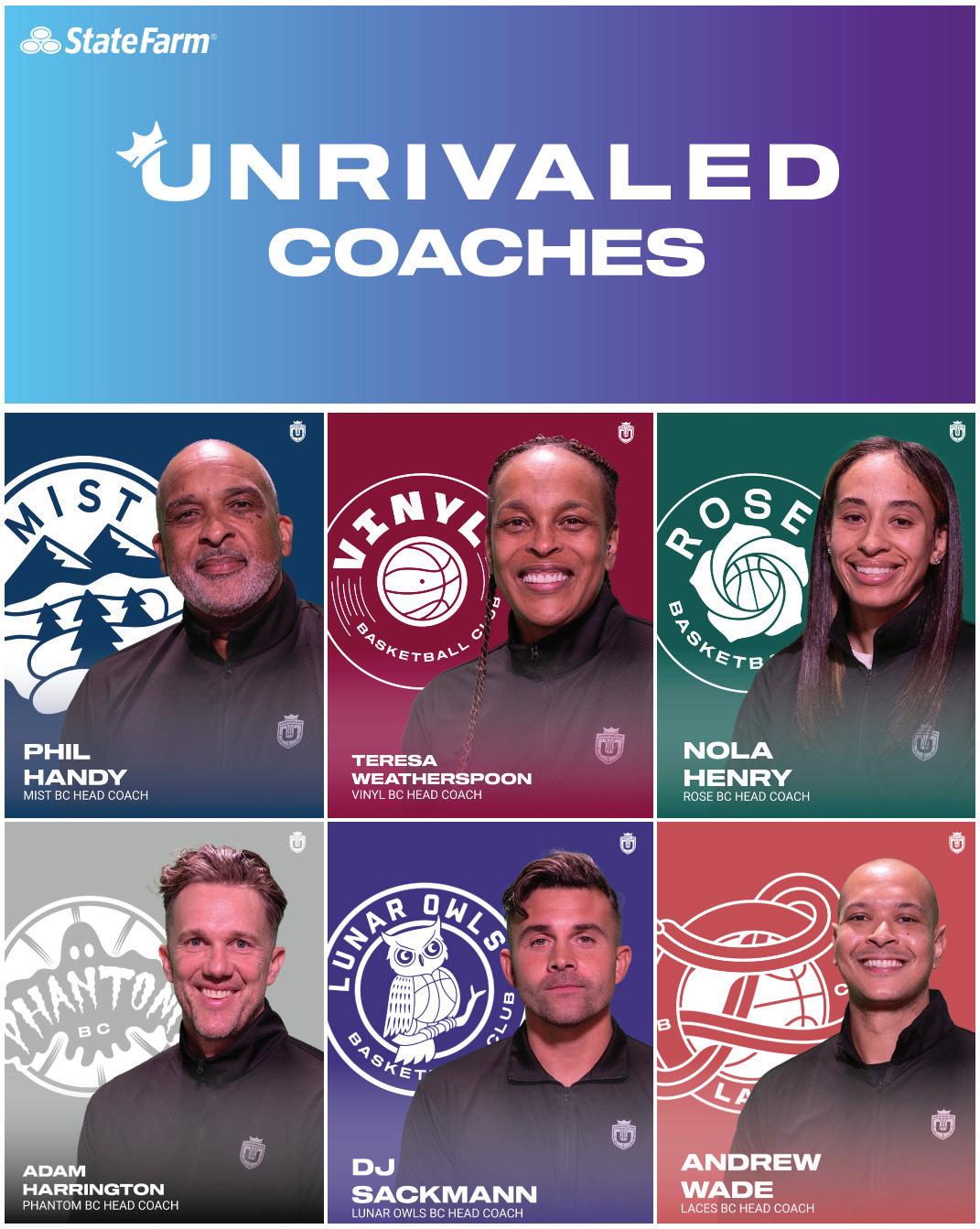
“It’s like [what] we did in the Wubble back during Covid,” said Dearica Hamby, comparing it to when the entire 2020 WNBA season was played at one site in Florida. She, Jordin Canada, and Aliyah Boston from the Vinyl BC squad
spoke to reporters, including the MSR, on the January 7 Zoom call.
“We get to spend time with the other girls,” continued Hamby, the 6’3” forward who plays for the Los Angeles Sparks and has been in the W since 2015. “We’re all hanging out in the training room, sharing stories. We can see just from everybody the energy and the order that’s going around here.”
Hamby also has experience playing 3x3 basketball, selected to fill a vacancy on the USA’s women’s 3x3 basketball team for the 2024 Paris Olympics — 36 players plus six coaches are in
“People

don’t come easy. Savannah Gardner was the recruiting focus of several

Courtesy UST Athletics
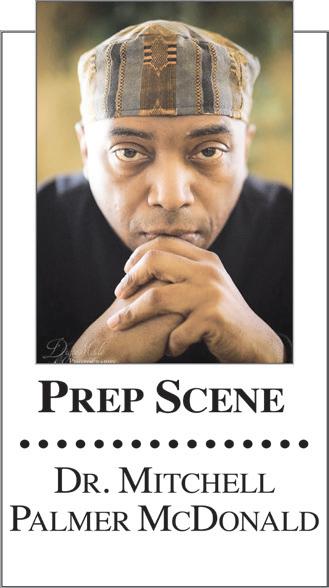

his week’s ‘Fab Five’ photos reflect the St. Paul Johnson Governors’ 62-60 City Conference victory over the St. Paul Harding Knights Friday, January 19, 2025.
With Colin Moore Jr. running the point, Kenny Turner and Tyrel Pride led the Governors with 18 points apiece. Tobis Williams (23 points), Ai’Jhon Douglas (16), and Neyo Chea (9) led the Knights.
Dr. Mitchell Palmer McDonald welcomes reader comments to mcdeezy05@gmail.com.
All Photos by Dr. Mitchell Palmer McDonald
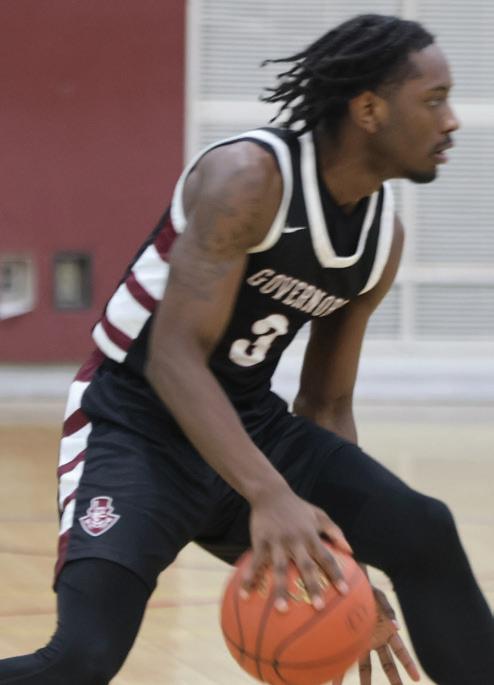
colleges and universities during her Eastview High School days. The Apple Valley native told the MSR that several factors came into play in eventually settling on attending the University of St. Thomas for
“I like that my teammates are always willing to help me out when it comes to school or getting extra shots up or anything like that.”
academics and basketball.
Staying close to home was a prime reason, she said.
“[At first] I wanted to get out, I wanted to go far [from home].
I was at an AAU game and neither of my parents could make it because they were both sick,” recalled Gardner. “Then I realized I had no one to go hug [afterwards], how much it meant to me them being there to watch me.”
The nurturing environment at St. Thomas, its St. Paul campus and its proximity for her folks and others to attend her
■ See SOE on page 9

t is no secret — I unabashedly root for Black coaches. It’s not even two weeks into the new year, about halfway through the college basketball season, before criticism of Ben Johnson’s job as Minnesota men’s coach is being slyly planted into news reports by PWM (primarily white media), which in turn simultaneously plants seeds of doubt in Gopher fans who read such reports.
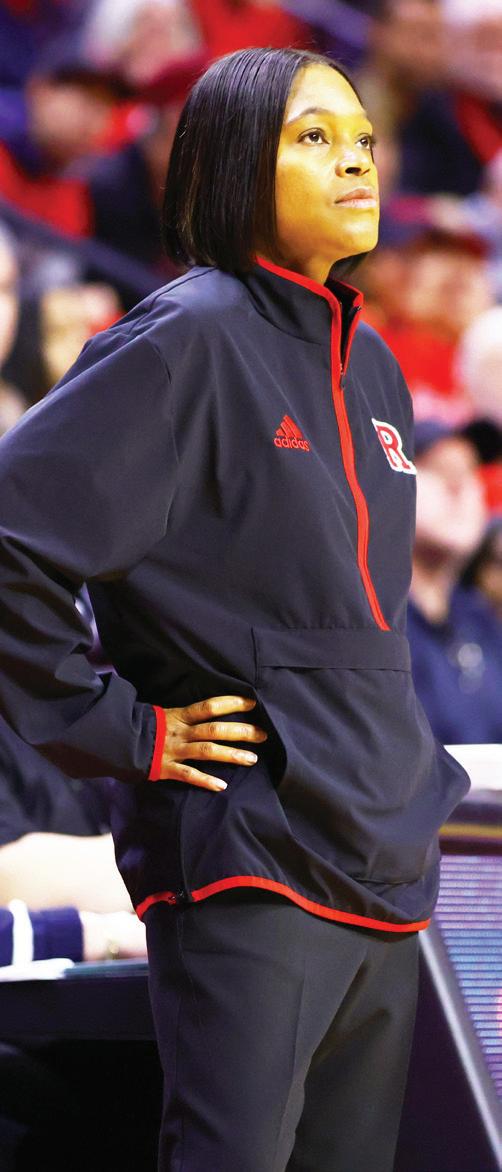
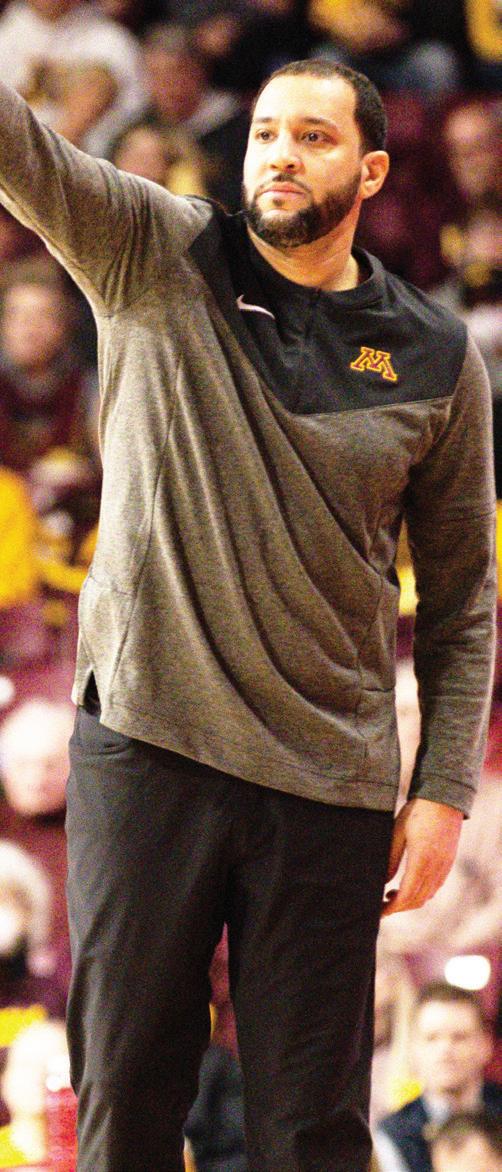
“The frustration surrounding Johnson and his program could only get louder,” surmised a Star Tribune article last week on Gopher men’s basketball.
Then, before their scheduled Jan. 5 home game against USC, a Rutgers freshman women’s basketball player threw her head coach under the proverbial bus by an-
nouncing on social media that she was being benched. Coach Coquese Washington, however, refused to make public her decision.
Following is Washington’s post-game comments when she responded to a reporter’s question:
“For me, coaching is not just about what happens on the court on gameday,” said the head coach. “It’s about how we impact these young women that are in our program in all aspects, from their character to their growth into womanhood and their decision-making. I see my role as a coach as being more than Xs and Os and wins and losses,




